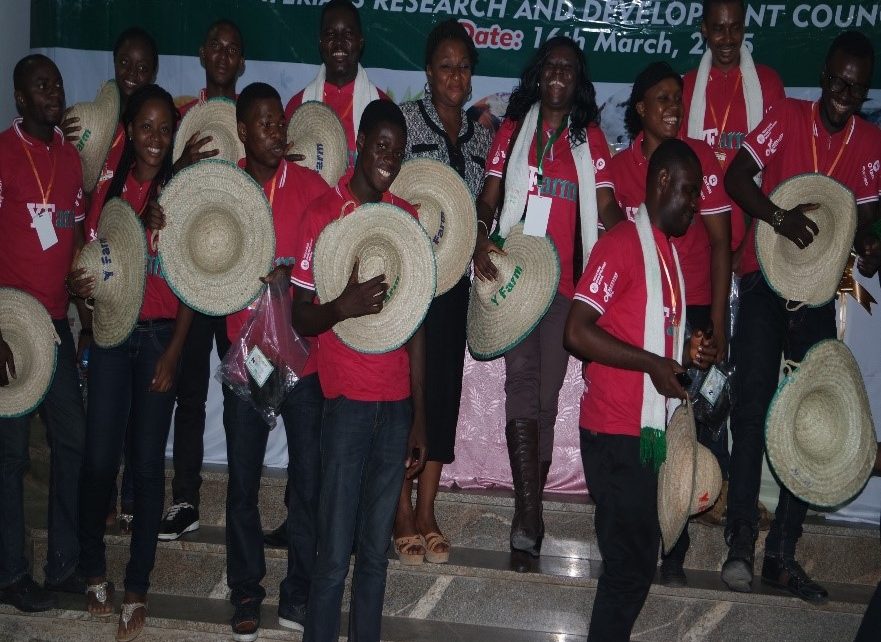| Context
Employment and entrepreneurial opportunities for youth, particularly those living in rural areas, remain limited in Nigeria. Agriculture has come into policy focus on the African continent as an engine of economic growth and, simultaneously, a sector in which to absorb masses of unemployed youth. For this policy vision to be achieved, new opportunities for employment must be identified youth in the agrifood sector (from production down the entire value chain) that are attractive and accessible to young people.
Implementation of program: The Youth Farm (YFarm) project began in 2014 as an initiative of Fresh & Young Brains Development Initiative and Alexijan Nigeria. The aim of the YFarm project is to establish at least 10,000 youth-led, climate-smart farms and agribusinesses across Africa by 2020. YFarm directly engages youth and different stakeholders in agriculture to create agrijobs and access to the market that will increase youth incomes, counter youth restiveness and unemployment, and promote food security. YFarm uses multiple strategies to raise interest and awareness, including outreach to schools and communities on agribusiness, exhibitions and youth agricultural festivals, a mock parliament on Food Security and Climate Justice, and the institution of awards for best youth farmer. Importantly, through project’s YFarm: My Farm, My Swag social media and public campaign, agriculture is promoted among rural and semi-urban youth as a fun activity, a way of life, a career and a business. For capacity-building and resourcing, bootcamps and farm demonstrations are carried out, as well as research and documentation on agribusiness, and further, beneficiaries receive a farming starter-pack to begin farms. The project targets youth (rural, poor, uneducated, youth with disability and those from conflict prone communities) and females in selected communities across Africa.
Main Challenges YFarm faces challenges of very limited access to finance to run community outreaches and agribusiness incubators, farm demonstrations, boot camps and festivals. The project received an initial grant approval from the former chairperson of the African Union Commission, with support from UNDP, to establish the YFarm Agribusiness Incubation Centre (One stop centre for African Youth) to be hosted in Nigeria. Unfortunately, the grant was not given thereby putting a stop on the centre plan. There is also a challenge with access to farm inputs, mentoring, technology and market. Most project beneficiaries do not have finance to upscale their farms from the starter packs they are given and also face bureaucratic bottlenecks registering their farm products with the relevant government agencies. The project has a target to reach over 20,000 youth but, due to limited support and poor visibility, it is less than 20% of reaching the desired goal.
Results Achieved and Expected YFarm Project has trained over 1,000 youth in Agribusiness and has directly supported over 450 youth and women with poultry starter packs, and 14 youth with sub-grant to start their agribusinesses. Of the 14 YFarm sub-grantees, about 7 youth still run their small-scale farms focusing on vegetables, oil palm production, cat fish, poultry, crop and livestock production. Other youth whose farms were affected by climate change are currently undergoing mentorship on climate smart agriculture.
Overall, YFarm project has directly benefitted over 3,000 youth as well as over 300,000 indirect beneficiaries through policy advocacy, public engagement, media and online campaigns, youth agric festivals (national and Africa), Bootcamps/trainings, community outreaches, documentary and participation/exhibition in national, regional and international events/conferences on agribusiness, climate smart agriculture and climate change.
Moving Forward The project plans to establish community-based agribusiness and climate smart incubation centres to address the concerns of project beneficiaries: training, storage, processing, branding, packaging, registration, sale and export of youth-led agro-products. The project can be sustained and expanded through financial, material and technical support by Government, donor organizations and private sector. Visibility can also be given to the project by the media.
Replicability YFarm Project is successful because of the passion and leadership skills of the project team. YFarm also uses several strategies that address the varying challenges to young people’s engagement in agriculture such as the negative image of the sector; young people’s lack of access to financial capital, land, inputs, technology and markets; and so on. Thus, strategies to directly reach individual young people must be combined with those that attempt to raise change both the social and policy environment to be more conducive to young people’s participation, through employment and entrepreneurship, in the agrifood sector. |
| References
Nnaemego, N. (2017, October 5). Youth Farm (YFarm Project). Presentation at the UNECA workshop on ‘Youth Policy Options’ in Addis Ababa on 5 October 2017. |
Project Details
Date: November 20, 2017
